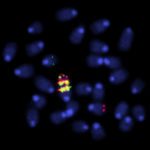Présentation
DNA double-strand breaks (DSBs), although common, are extremely dangerous (Deriano and Roth, Annual Review of Genetics, 2013). Unlike most other DNA lesions, DSBs directly threaten genomic integrity by disrupting the physical continuity of the chromosome. A particular threat posed by DSBs arises from repair mechanisms themselves, which, if not executed properly, possess formidable power to wreak genomic havoc. Inappropriate repair of DSBs can cause localized sequence alterations, loss of genomic material, interstitial deletions, inversions, and chromosome translocations, which can initiate neoplastic transformation by a variety of mechanisms. Studies of the repair of physiological DNA double-strand breaks (DSBs) generated by the RAG1/2 enzyme at specific sites during lymphocyte differentiation (i.e. V(D)J recombination) have provided valuable insights into DNA end joining mechanisms. We hypothesize that, in lymphocytes, the RAG complex and the DNA damage response (DDR) machineries co-evolved to promote antigen receptor diversity without conferring predisposition to genomic instability and cell transformation. We use biochemical, genetic, proteomic and cellular approaches to test functional redundancy between the RAG complex and DDR factors in V(D)J recombination and genome stability and to identify novel players of DNA recombination.





